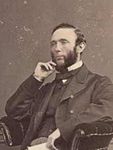| ||||||||||||||||||||||
All 86 seats in the Victorian Legislative Assembly 44 seats needed for a majority | ||||||||||||||||||||||
|---|---|---|---|---|---|---|---|---|---|---|---|---|---|---|---|---|---|---|---|---|---|---|
| ||||||||||||||||||||||
| ||||||||||||||||||||||
The July 1880 Victorian colonial election was held on 14 July 1880 to elect the 11th Parliament of Victoria. All 86 seats in 55 electorates in the Legislative Assembly were up for election, though eight seats were uncontested.
There were 31 single-member, 20 two-member and 5 three-member electorates.
The Constitutionalist (moderate liberal) government of James Service was defeated by the liberal (or protectionist) opposition led by Graham Berry, who formed a new government on 3 August 1880.
Results
| Party / Grouping | Votes | % | Swing | Seats | Change | ||
|---|---|---|---|---|---|---|---|
| Liberal (Protectionist) | 113,755 | 53.93 | 49 | ||||
| Constitutionalist | 95,586 | 45.31 | 35 | ||||
| Independent | 1,606 | 0.76 | 2 | ||||
| Totals | 210,947 | 86 | |||||
Aftermath
Berry's new cabinet was more moderate than his previous one. A new bill to reform the Legislative Council, despite the abandonment of provisions for resolving deadlocks which had been the cause of previous difficulties, was still unable to be passed when the council refused to accept the lowering of property qualifications. Berry's position as premier became increasingly tenuous as he faced opposition from parliamentary conservatives, advocates of concessions for Catholic education and malcontents in his own party opposed to his moderate stance on upper house reform.
In late June 1881 Bryan O'Loghlen moved a motion of no confidence in Berry's government. O'Loghlen, a liberal with a devotion to Irish-Catholic causes, had been appointed attorney-general in Berry's cabinet in 1878 and had been the acting premier from December 1878 to June 1879 during Berry's absence in London. After the July 1880 election he declined a position in Berry's cabinet when his advocacy of educational concessions for Catholics was rejected. After days of debate, on 1 July 1881 the censure initiated by O'Loghlen was carried by 41 votes to 38 with support from the conservative opposition. The Victorian Governor refused Berry's request to dissolve parliament and invited O'Loghlen to form a government. His cabinet was announced on July 10, seven members of which had been members of the opposition. O'Loghlen himself took on the roles of premier, attorney-general and treasurer.
O'Loghlen's ministry lacked a majority in the parliament, but was kept in office with conservative support. By the time of the parliamentary break at the end of 1882 considerable discontent had arisen at O'Loghlen's conduct in regard to a major overseas loan to finance a railway programme. In late January 1883, anticipating a censure motion when parliament resumed, O'Loghlen was granted a dissolution of parliament.
See also
References
- ^ "The Eleventh Parliament Elected 14 July 1880". Psephos: Adam Carr's Electoral Archive.
- Geoffrey Serle (1976), James Service (1823–1899), Australian Dictionary of Biography website, National Centre of Biography, Australian National University; accessed 11 December 2023.
- Geoffrey Bartlett (1969), Sir Graham Berry (1822–1904), Australian Dictionary of Biography website, National Centre of Biography, Australian National University; accessed 10 December 2023.
- ^ S. M. Ingham (1974), Sir Bryan O'Loghlen (1828–1905), Australian Dictionary of Biography website, National Centre of Biography, Australian National University; accessed 11 December 2023.
- The Month, Mount Alexander Mail, 4 July 1881, page 2.
- The Month, Mount Alexander Mail, 1 August 1881, page 2.
- Political Crisis: Dissolution of Parliament, The Argus (Melbourne), 31 January 1883, page 8.
- History of the Last Parliament, The Age (Melbourne), 3 February 1883, page 2.

